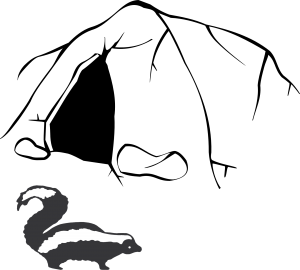
You may not realize it, but that nuisance animal in your attic, shed, garage or on your property might be legally protected in Illinois.
Most wildlife is protected by law and cannot be killed or even removed without a permit.
The Illinois Department of National Resources is tasked with conservation and management of wild species in Illinois. By Illinois law, a property owner or tenant needs a Nuisance Animal Removal Permit to trap and remove most species of wildlife.
By Illinois law, property owners or tenants need a Nuisance Animal Removal Permit (PDF) to trap and remove most species of wildlife.
Is the animal you want to remove a protected species? We’ve listed the most common nuisance animals in Illinois below.
Questions? Call Attic Solutions at (847) 464-1861
Mice, Norway rats, moles, voles, gophers, and shrews
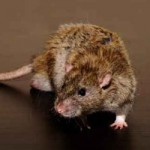 These small mammals may all be removed with no permit needed.
These small mammals may all be removed with no permit needed.
Exceptions to this rule include the eastern woodrat and rice rat, which are endangered species in Illinois. These two species may not be removed.
Related: Rat and Mice removal and control
Ground squirrels and chipmunks
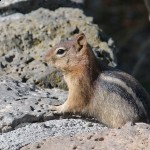 The eastern chipmunk and the thirteen-lined ground squirrels may be removed without a permit.
The eastern chipmunk and the thirteen-lined ground squirrels may be removed without a permit.
Franklins ground squirrels are listed as threatened in Illinois and may not be removed.
Raccoons, skunks, opossums, beavers, muskrats, red foxes, gray foxes, mink, river otters, badgers, weasels, woodchucks, coyotes, and bobcats
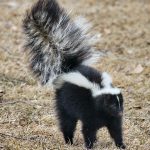
The Illinois Department of Natural Resources (IDNR) recommends hiring a professional wildlife removal service to capture and remove fur-bearing animals. If you want to remove a fur-bearing animal yourself, contact an IDNR District Wildlife Biologist to see if you qualify for a Nuisance Animal Removal Permit.
In rural areas, the IDNR encourages removal of most furbearers during open hunting and trapping seasons whenever possible. All Illinois hunting regulations must be followed. For more information on hunting and trapping regulations, visit the IDNR Licenses & Hunting site.
Related: Common animal entry points
Gray squirrels, fox squirrels, red squirrels, and southern flying squirrels
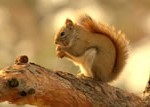 The Illinois Department of Natural Resources (IDNR) recommends hiring a professional wildlife removal service to capture and remove squirrels. If you want to remove a squirrel yourself, contact an IDNR District Wildlife Biologist to see if you qualify for a Nuisance Animal Removal Permit.
The Illinois Department of Natural Resources (IDNR) recommends hiring a professional wildlife removal service to capture and remove squirrels. If you want to remove a squirrel yourself, contact an IDNR District Wildlife Biologist to see if you qualify for a Nuisance Animal Removal Permit.
In rural areas, gray squirrels and fox squirrels may be taken during open hunting seasons.
Related: How to Squirrel-proof your home
Rabbits
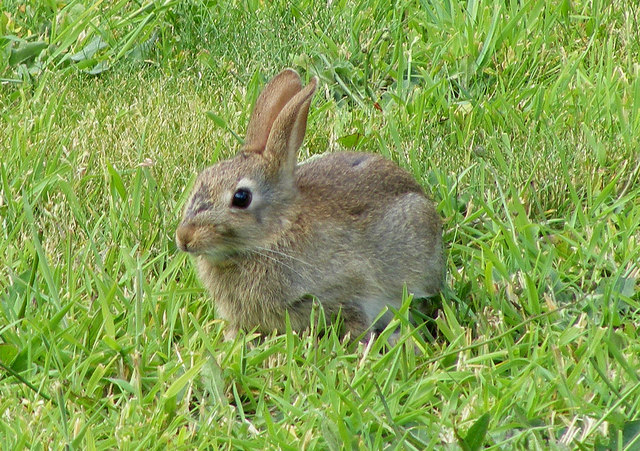 The Illinois Department of Natural Resources (IDNR) recommends hiring a professional wildlife removal service to capture and remove rabbits. If you want to remove a rabbit yourself, contact an IDNR District Wildlife Biologist to see if you qualify for a Nuisance Animal Removal Permit.
The Illinois Department of Natural Resources (IDNR) recommends hiring a professional wildlife removal service to capture and remove rabbits. If you want to remove a rabbit yourself, contact an IDNR District Wildlife Biologist to see if you qualify for a Nuisance Animal Removal Permit.
In rural areas, rabbits may be taken during open hunting seasons.
Bats
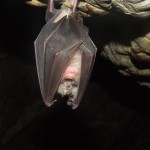 The (IDNR) recommends hiring a professional bat removal service to capture and remove bats.
The (IDNR) recommends hiring a professional bat removal service to capture and remove bats.
Bats inside rooms will usually exit on their own. Close off exits to the room and keep windows open overnight.
Related: How to get bats out of the house
White-Tailed Deer
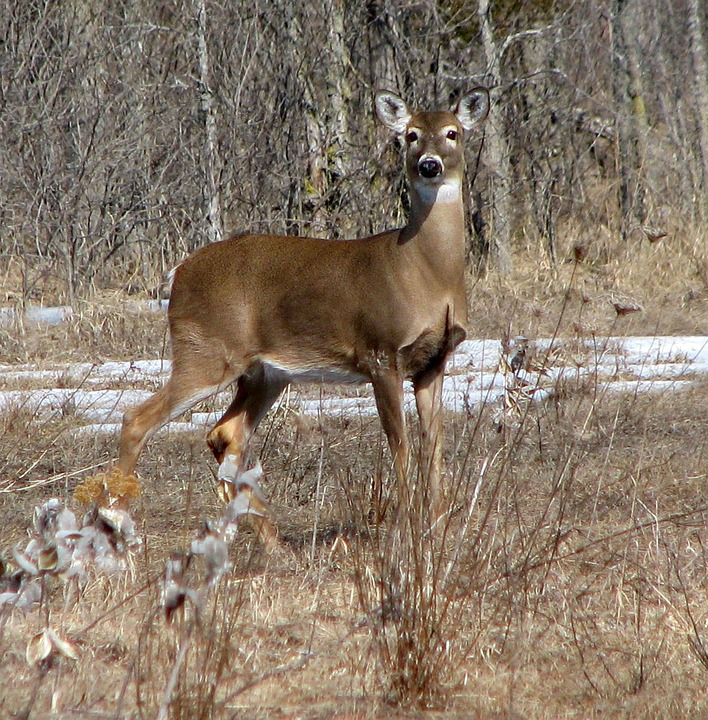 White-tailed deer are protected under the Illinois Wildlife Code as a game species. It is illegal to take live deer from the wild unless you have received a permit from the Illinois Department of Natural Resources (IDNR) or are a licensed wildlife rehabilitator.
White-tailed deer are protected under the Illinois Wildlife Code as a game species. It is illegal to take live deer from the wild unless you have received a permit from the Illinois Department of Natural Resources (IDNR) or are a licensed wildlife rehabilitator.
IDNR Deer Removal Guidelines (PDF)
In rural areas, deer hunting is permitted in season. All state hunting regulations must be followed. Outside of hunting season, or in situations where hunting is not allowed, a deer removal permit may be issued by an IDNR District Wildlife Biologist.
A person who hits and kills a deer with a motorized vehicle can legally claim the deer to salvage the meat, hide, and antlers.
For more information on hunting and trapping in Illinois visit the Illinois Department of National Resources.
For professional animal removal services in Chicagoland call Attic Solutions (847) 464-1861




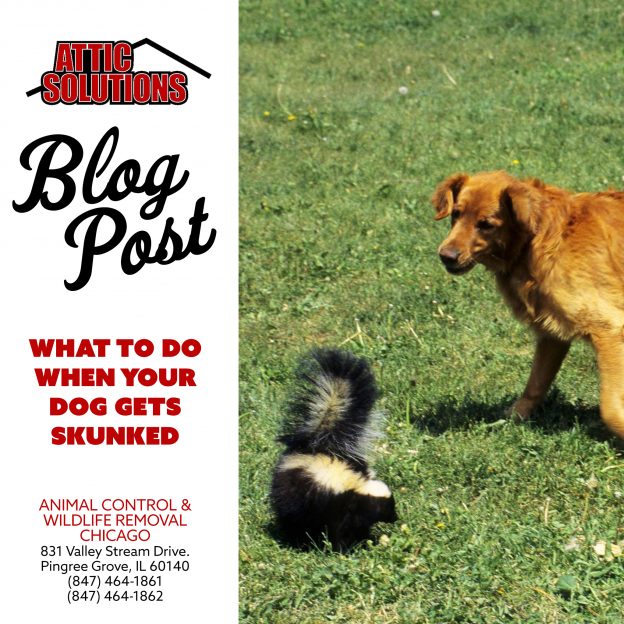
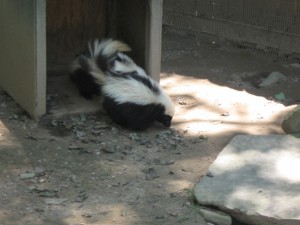 If you’ve already let your dog into the house, then sorry. Sometimes your dog comes inside the house before you realize what has happened.
If you’ve already let your dog into the house, then sorry. Sometimes your dog comes inside the house before you realize what has happened.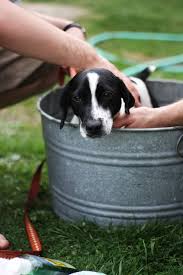 Get your dog into the wash tub and rub the mixture through their fur, and over their entire body, but be sure to avoid the eyes. Rub and lather the mixture well into your pet’s coat and skin. Rub the solution around for about five minutes or until the skunk smell starts to dissipate.
Get your dog into the wash tub and rub the mixture through their fur, and over their entire body, but be sure to avoid the eyes. Rub and lather the mixture well into your pet’s coat and skin. Rub the solution around for about five minutes or until the skunk smell starts to dissipate.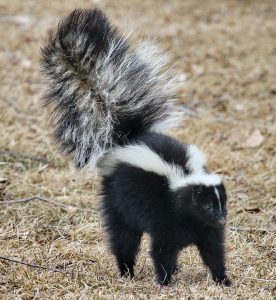
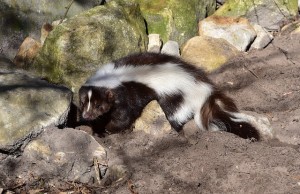
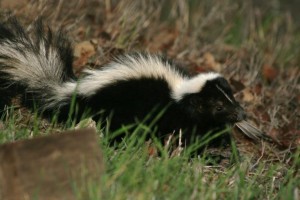
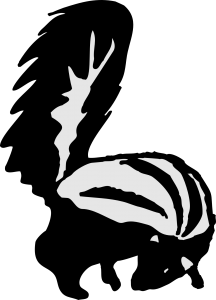 True hibernators have a considerably lower heart rate, have almost no respiration and only take a couple of breaths per minute. Skunks do not have these drastic drops in heart rate or respiration. Skunks do prepare for winter in similar ways as hibernating animals though. They eat large amounts so that during the long naps they do take they can survive on their fat stores.
True hibernators have a considerably lower heart rate, have almost no respiration and only take a couple of breaths per minute. Skunks do not have these drastic drops in heart rate or respiration. Skunks do prepare for winter in similar ways as hibernating animals though. They eat large amounts so that during the long naps they do take they can survive on their fat stores.